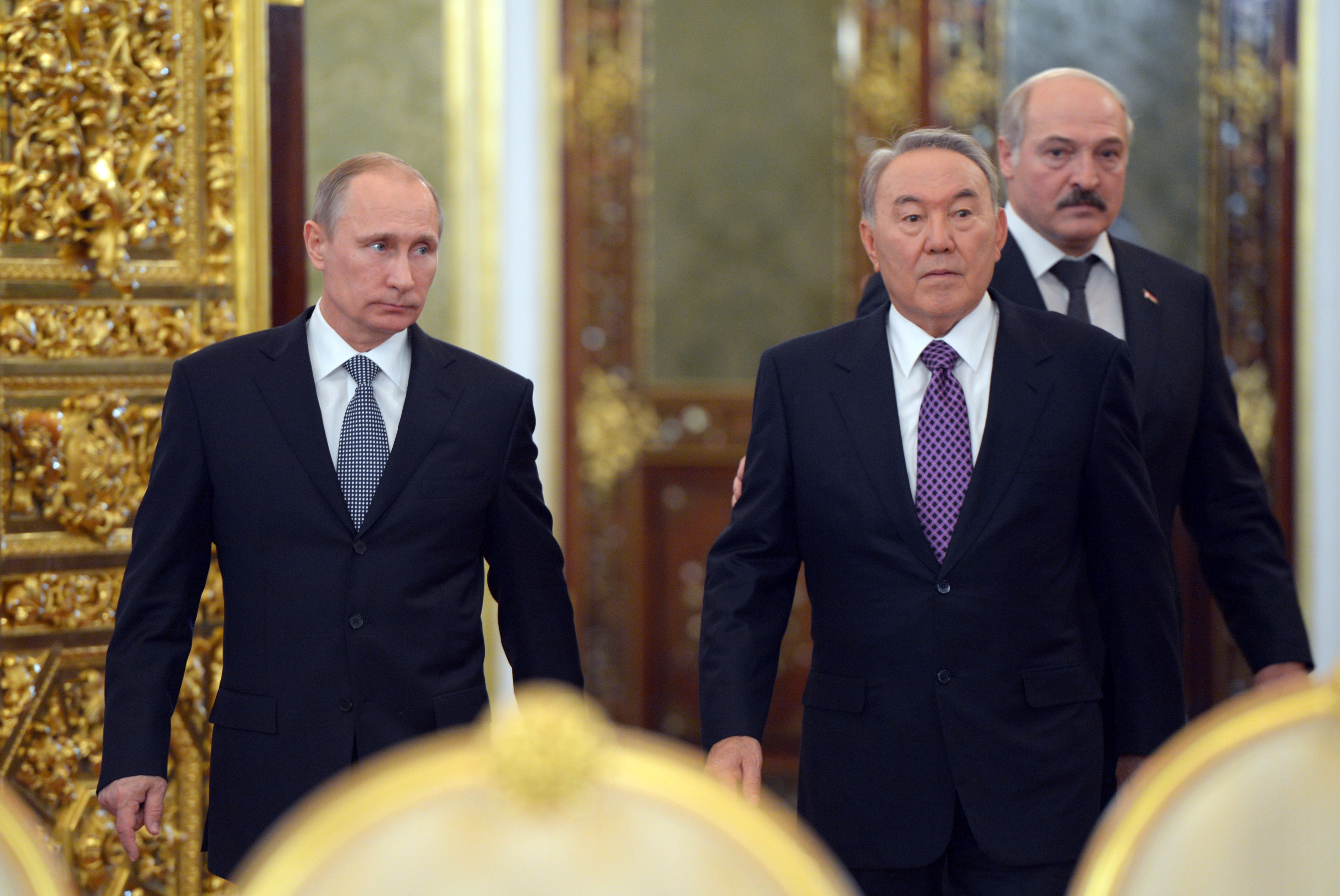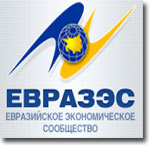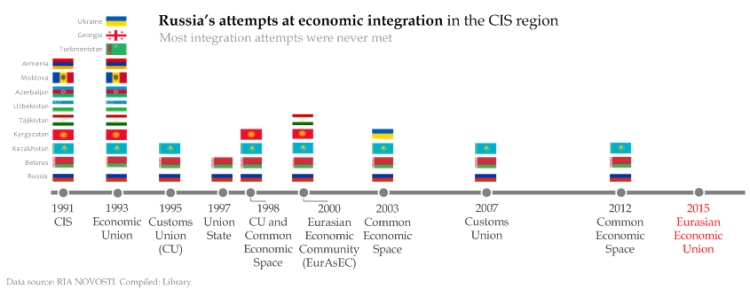Russia, Belarus and Kazakhstan set up new alliance

 The Eurasian Union it's an ambitious dream, designed not only as an economic alternative to the European Union but also as a philosophical mission to make Russia the geopolitical center for its neighbors
The Eurasian Union it's an ambitious dream, designed not only as an economic alternative to the European Union but also as a philosophical mission to make Russia the geopolitical center for its neighbors


The Soviet thing wont die...

The leaders of Russia, Belarus and Kazakhstan on Thursday created an economic union that intends to boost cooperation between the ex-Soviet neighbors, a pact which was at the source of the crisis in Ukraine.
Russian President Vladimir Putin said the Eurasian Economic Union — which Moscow had pushed Ukraine to join, helping spark the worst crisis in relations between Russia and the West since the Cold War — takes the countries' cooperation to a "new level" while respecting their sovereignty.

"We are creating a powerful and attractive center of economic development, a major regional market bringing together over 170 million people," Putin said during talks in Kazakhstan's capital, Astana. He added that the pact would allow the countries to exploit their economic potential and strengthen their positions in global markets.
With a combined annual economic output of $2.2 trillion a year, the alliance's economic size would be close to that of Britain and well below that of the U.S.'s $17 trillion.
The union is the development of the existing Customs Union including the same nations. In addition to free trade, it coordinates the members' financial systems and regulates industrial and agricultural policies along with their labor markets and transport systems. The deal stops short of introducing a single currency and delays the creation of a common energy market.
The signing followed years of tense negotiations, and many differences have remained.
The signing followed years of tense negotiations, and many differences have remained.

New Union's logo
Moscow will host the top executive body of the new alliance. Its high court will be based in Belarus, and the top financial regulator will be located in Kazakhstan.
Belarus' authoritarian President Alexander Lukashenko, who has depended on cheap Russian energy and other subsidies to keep his nation's Soviet-style economy afloat, said before the signing he wasn't fully happy with the deal, but hailed it reflected a mutually acceptable compromise.
Kazakhstan, led by autocratic President Nursultan Nazarbayev, is the second largest country by territory and economy among the ex-Soviet nations. Nazarbayev has maneuvered between Russia and the West during more than two decades in power. But Russia has little leverage over Kazakhstan, whose energy riches and booming economy make it an equal partner.
Nazarbayev said the new pact is based on consensus and well-balanced. He voiced hope that the new alliance "will become a powerful incentive for modernizing our economies and helping making them global leaders."
Armenian President Serge Sarkisian said his nation will be ready to join the union as early as next month after completing final preparations. Kyrgyzstan said it hopes to join the Customs Union, the precursor to the new alliance, before the year's end.
Russia tried to have Ukraine join the integration project and spike an association agreement with the European Union. But Ukraine's pro-Russia president, who spurned the deal with the EU in favor of closer ties with Moscow, was chased from power in February following months of protests. Russia then annexed Ukraine's Black Sea peninsula of Crimea, and a pro-Russia mutiny has engulfed eastern Ukraine, where rebels have seized government buildings and fought government troops.
The United States and the EU have responded to the Russian annexation of Crimea by slashing travel bans and asset freezes on members of Putin's entourage, and threatened to introduce further sanctions if Russia further tries to destabilize Ukraine.
Petro Poroshenko, a billionaire candy magnate who won Ukraine's presidential election on Sunday, vowed to integrate more closely into Europe. Ukraine's foreign minister told journalists Thursday that the country hopes to meet with EU officials before June 27 to determine when Ukraine would be able to sign an association agreement with the 28-member bloc.

In Astana, Lukashenko, known for his blunt statements, said that "sooner or later the Ukrainian leadership will understand where the nation's happiness lies."
Moscow's annexation of Crimea, which it explained by the need to protect ethnic Russians, has spooked many of its neighbors, including Kazakhstan, which has a significant Russian minority.
The Kremlin has sought to assuage such fears, and Lukashenko used Russia's desire to sign the pact to bargain for some last-minute economic advantages. Russia has agreed to allow Belarus to keep a greater share of revenues from selling oil products made from Russian crude, a deal that would add $1.5 billion to Belarusian state coffers this year.
Reuters: 29 May 2014
Ukraine's empty seat at table darkens party for Putin's new ex-Soviet bloc
By Raushan Nurshayeva and Alexei Anishchuk
Reuters: 29 May 2014
Ukraine's empty seat at table darkens party for Putin's new ex-Soviet bloc

Russian President Vladimir Putin welcomed Kazakhstan and Belarus on Thursday into a new Eurasian Economic Union built to rival the United States, EU and China - but the absence of Ukraine undermined his dream of restoring Soviet glory days.
Although Putin denies he is trying to rebuild the USSR, he makes no secret that his dream is to reverse the consequences of its breakup by drawing former Soviet states closer together. The signing ceremony, held in Kazakhstan's new oil-funded boomtown capital Astana, was his biggest step yet in realising that goal.
But events since February - when a pro-Russian leader was toppled in Ukraine, Putin responded by seizing Ukraine's Crimea peninsula and the West imposed sanctions - have cast a pall over the new union's birth.
The Eurasian Economic Union that has taken shape after years of planning is a shadow of the economic powerhouse Putin once dreamed of, snubbed by most former Soviet states and dominated by a Russian economy that is itself sliding into recession.

Still, the new union has a market of 170 million people, a combined annual GDP of $2.7 trillion and vast energy riches, and it can be held up by Putin to show Western sanctions imposed over the annexation of Crimea will not isolate Russia.
The treaty deepens ties forged when the three countries took the initial step of creating a customs union in 2010. It guarantees the free transit of goods, services, capital and workforces and coordinates policy for major economic sectors.
"Our meeting today of course has a special and, without exaggeration, an epoch-making significance," Putin said of the treaty, signed to loud applause from rows of seated officials.
"This document brings our countries to a new stage of integration while fully preserving the states' sovereignty."
His reference to sovereignty was telling because Kazakhstan fought hard during negotiations to ensure it did not give up any of the independence it won as the Soviet Union collapsed, scotching Russian hopes of creating a political union.
Kazakh President Nursultan Nazarbayev, seated at a long white desk at which he, Putin and Belarussian President Alexander Lukashenko signed the treaty, said the union would be an "economic bridge between the East and the West".
Lukashenko darkened the party's mood by mentioning the most important of the guests that stayed away.
"We lost someone, Ukraine ... for Ukraine, the burden was too heavy," the Belarus leader said. "Sooner or later the Ukrainian authorities will know where happiness is."

PUTIN'S DREAM
The Eurasian Economic Union will formally come into force on Jan. 1 once approved by the countries' parliaments, a formality for three presidents that have no serious internal opposition.
The union - an idea first raised by Nazarbayev in 1994 but widely ignored at the time - brings to life Putin's dream of uniting like-minded countries, capitalising on the nostalgia of many Russians for the order and relative economic and political stability of the communist Soviet empire that collapsed in 1991.
Putin noted that Kazakhstan and Russia accounted for one-fifth of the world's natural gasreserves and 15 percent of oil reserves - although Belarus's struggling economy looks like a burden for Astana and Moscow.
The new union reinforces Putin's drive to show Russia will not be isolated by sanctions, a message he sent by reaching a $400-billion gas supply deal with China last week.
But any hopes of rebuilding a large part of the Soviet Union have been thwarted by Ukraine, with some 45 million people, by far the most populous ex-Soviet state after Russia itself.
That blow, in the words of ex-Kremlin spin doctor Gleb Pavlovsky, makes Putin's original dream "impossible" to fulfil.
Armenia and Kyrgyzstan, both tiny and poor, are considering joining. But other ex-Soviet republics, including big energy producers Azerbaijan and Turkmenistan, have steered clear.

Shortly before the treaty was signed, Russia's biggest bank reported an 18 percent decline in profits in the first quarter and more than doubled its provision for bad loans, with sanctions and instability caused by the Ukraine crisis partly to blame.
The creation of the new alliance also involves costs for Russia. Deputy Finance Minister Sergei Shatalov told Reuters in March that Belarus and Kazakhstan received about $6 billion annually from Russia in direct and indirect support, and said that could increase by $30 billion if all trade restrictions were lifted in 2015 after the union is created.

No comments:
Post a Comment